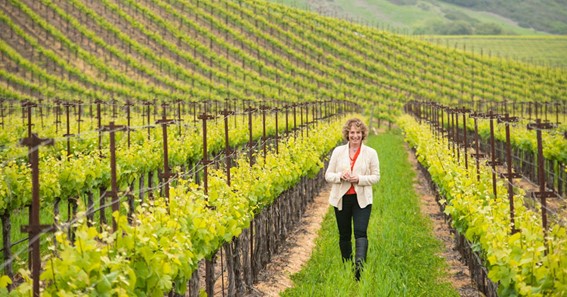Are you curious to know what is the vineyard? You have come to the right place as I am going to tell you everything about the vineyard in a very simple explanation. Without further discussion let’s begin to know what is the vineyard?
Nestled amidst picturesque landscapes, the term “vineyard” conjures images of sprawling fields of grapevines, basking in the sun as they produce the fruit that gives birth to the beloved beverage known as wine. A vineyard is more than just a farm; it is a testament to the art and science of winegrowing and winemaking. In this blog post, we will explore what a vineyard entails, its significance in the world of wine, and the processes involved in creating this timeless elixir.
What Is The Vineyard?
A vineyard is an agricultural plot of land specifically cultivated for the cultivation of grapevines, primarily with the purpose of producing grapes for winemaking. Vineyards can range in size from small family-owned estates to large commercial operations, each with its unique characteristics and approaches to wine production. They are often located in regions with favorable climate and soil conditions that are conducive to grape cultivation.
Key Elements Of A Vineyard
- Grapevines: At the heart of every vineyard are the grapevines themselves. Grapevines are cultivated for their ability to produce grapes, which serve as the raw material for winemaking. Different grape varieties are grown, each possessing distinct flavors, aromas, and characteristics that contribute to the diversity of wines produced.
- Terroir: The concept of “terroir” refers to the unique combination of environmental factors that influence grapevine growth and the resulting wine. These factors include climate, soil composition, topography, and microclimate. The terroir of a vineyard plays a vital role in shaping the quality, flavor profile, and style of the wines it produces.
- Viticulture: Viticulture is the practice of grapevine cultivation. It involves tasks such as planting, pruning, trellising, canopy management, pest and disease control, and irrigation. Skilled viticulturists employ various techniques to ensure the health and optimal growth of the grapevines, ultimately maximizing the quality and yield of the grapes.
Winemaking Processes
Once the grapes are harvested from the vineyard, the winemaking process begins. While the specifics can vary depending on the winemaker’s approach and the desired wine style, the general steps include:
- Harvesting: Grapes are carefully harvested at their optimal ripeness, taking into account factors such as sugar levels, acidity, and flavor development. This timing is crucial in capturing the desired characteristics of the grapes.
- Crushing and Pressing: Grapes are crushed to release the juice, which is then separated from the grape solids. In the case of white wines, the juice is typically pressed gently to minimize contact with the grape skins. Red wines often involve fermenting the juice along with the grape skins to extract color, tannins, and flavors.
- Fermentation: The grape juice undergoes fermentation, where yeast converts the sugars into alcohol. Fermentation can take place in stainless steel tanks, oak barrels, or other vessels, depending on the winemaker’s preference.
- Aging and Maturation: Following fermentation, wines may undergo further aging and maturation to develop complexity and enhance flavors. This can involve storing the wine in oak barrels or stainless steel tanks for a specific period, allowing it to harmonize and evolve.
- Bottling: Once the winemaker determines the wine has reached its desired characteristics, it is bottled, often with careful consideration of labeling, packaging, and presentation.
Conclusion
The vineyard is a captivating realm where the art of winegrowing and winemaking comes to life. It represents a harmonious interplay between the grapevines, the terroir, and the skilled hands of the winemakers. From meticulous vineyard management to the delicate processes of harvesting, crushing, fermenting, and aging, the vineyard is where the foundation of exceptional wines is laid. Whether exploring a small family-owned vineyard or a renowned wine estate, each visit offers an opportunity to appreciate the craft, dedication, and sheer beauty behind the creation of this timeless elixir—wine.
If you find out some similar topics then visit here to https://seefounder.com/
FAQ
What Is The Meaning Of The Vineyard In The Bible?
We belong to God through Christ, so we are his vineyard. Each individual Christian is a branch on the vine of Jesus (see John 15:1-8). Jesus shows us that we are to bear much fruit. Indeed, this is the sign of true discipleship.
What Is The Vineyard Of God?
In Matthew 20 Jesus told a parable in which the church is shown as the vineyard of God. The parable starts out, “For the kingdom of heaven is like unto a man that is a householder, which went out early in the morning to hire laborer’s into his vineyard” (Matthew 20:1).
What Does The Vineyard Church Believe In?
We believe in the Holy Spirit, who came to regenerate and empower for ministry all who repent of their sins and trust in Jesus. The Holy Spirit dwells in every believer in Christ and is their Helper, Teacher, and Guide. We believe in the exercise of all the Biblical gifts of the Spirit.
What Is The Vineyard Controversy?
The co-founder of the Vineyard religious movement and eight former board members are suing two pastors for $62 million, accusing the married couple of engaging in “spiritual fraud” to gain financial control of the sect’s flagship Anaheim church before seceding from the denomination in 2021.
I Have Covered All The Following Queries And Topics In The Above Article
What Is Wrong With The Vineyard Church
What Is The Population Of Martha’s Vineyard
What Is The Deal With Martha’s Vineyard
What Is The Big Deal About Martha’s Vineyard
What Is The Racial Makeup Of Martha’s Vineyard
What Is The Vineyard
What does vineyard mean
